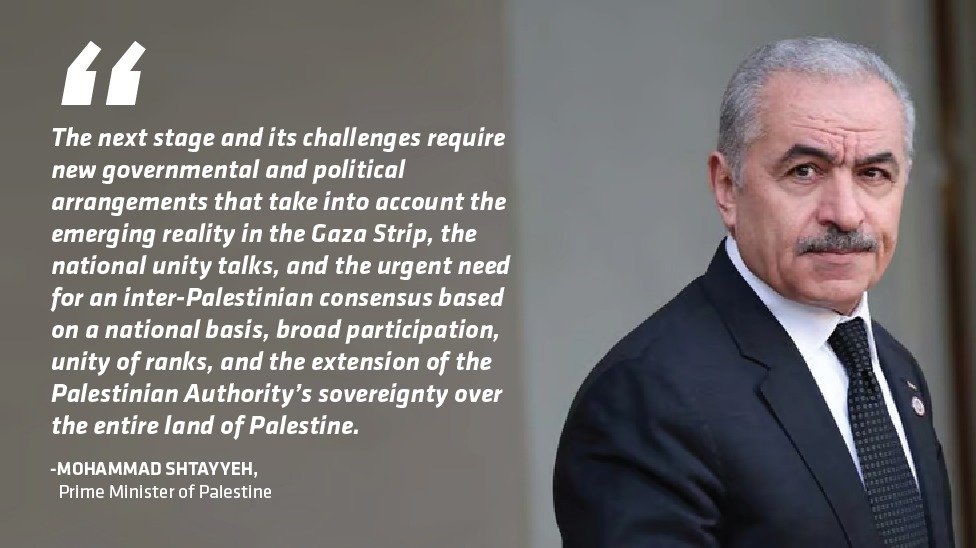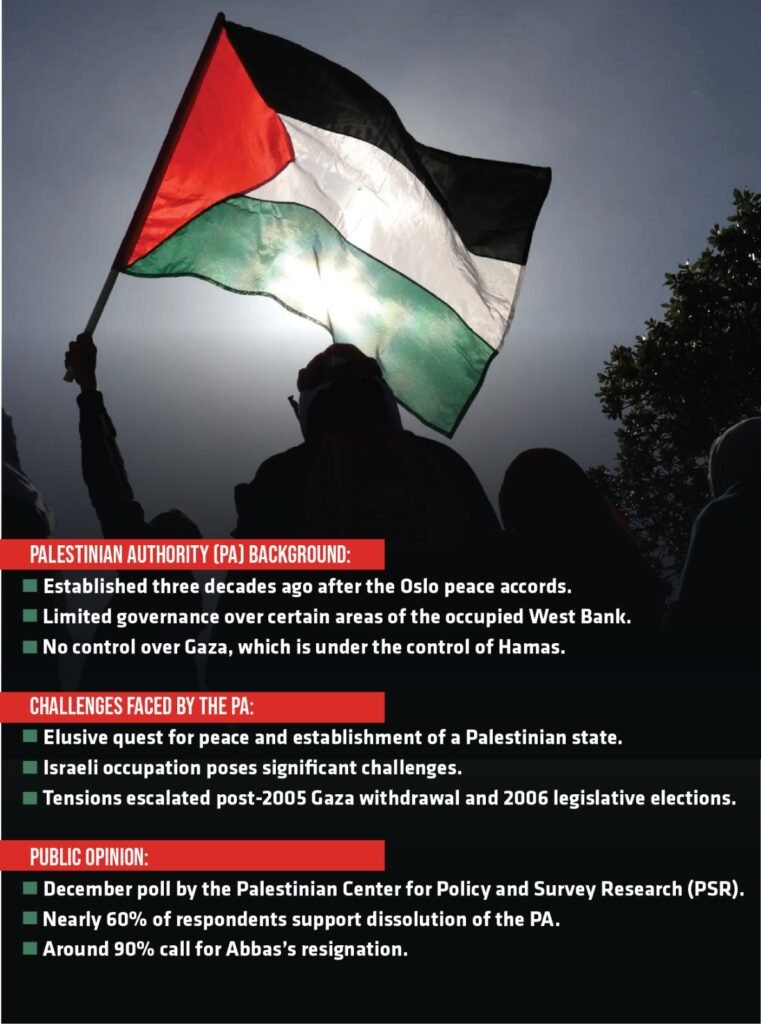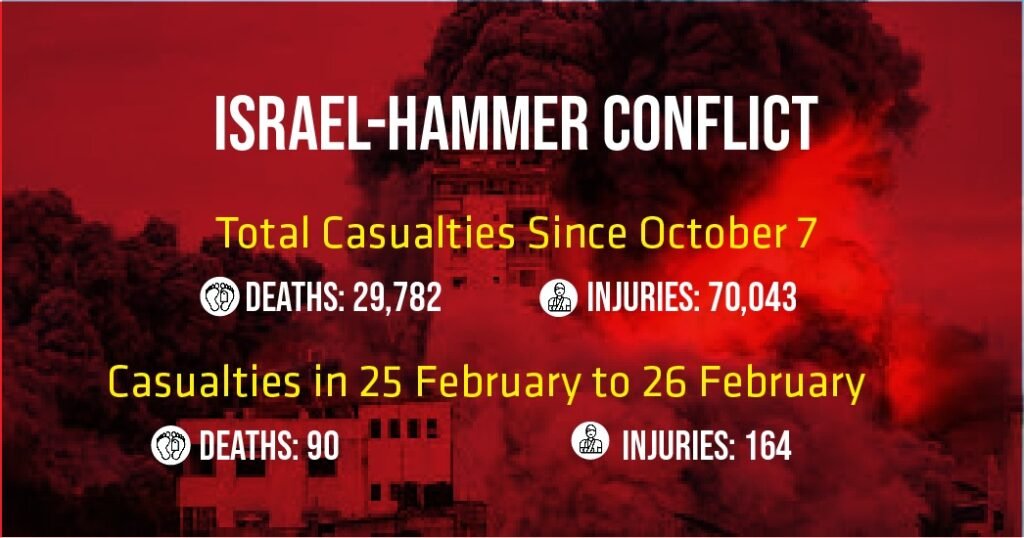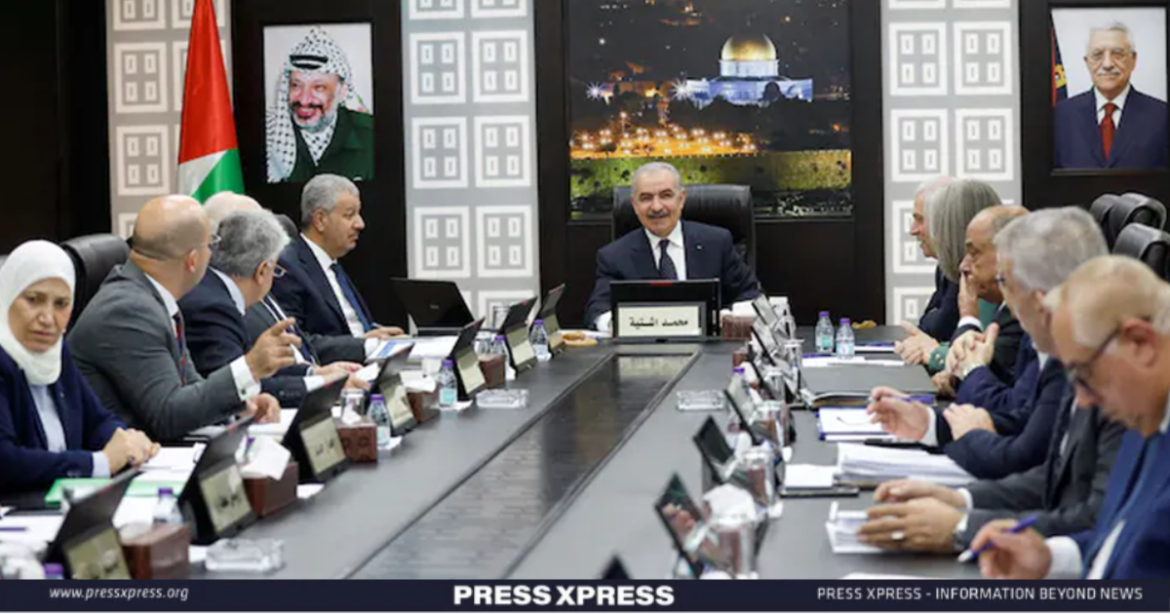Key highlights:
- Palestinian Prime Minister Mohammad Shtayyeh resigned on Monday, February 26th.
- A December poll by the Palestinian Center for Policy and Survey Research revealed that nearly 60% of respondents in the West Bank and Gaza support the dissolution of the PA.
- The US proposes a postwar resolution roadmap, envisioning Saudi Arabia’s recognition of Israel, alongside other Arab nations, and a revitalized PA to aid in Gaza’s reconstruction and governance.
- From February 25th to February 26th, the Israeli military reported the deaths of 90 Palestinians and injuries to 164 others.
In the Israeli-occupied West Bank, the Palestinian Authority (PA), is in the midst of a transformation following President Mahmoud Abbas’ acceptance of Prime Minister Mohammad Shtayyeh’s resignation along with his cabinet on Monday, February 26th. Regarding the events unfolding in the Gaza Strip, the West Bank, and Jerusalem, Shtayyeh announced his resignation during a routine cabinet session in Ramallah, citing the difficult conditions under which his government operated.
Shtayyeh’s comments come at a time when the United States is increasing its pressure on Abbas to revamp the Palestinian Authority and lay the groundwork for governing a prospective Palestinian state following the conflict.
You can also read: Saudi Arabia Rockets to 16th in G20 GDP Soar
This signals a potential shift in Palestinian governance, seen as crucial by Washington and other nations for the Palestinian Authority to play a more substantial role in the reconstruction of Gaza post-war. Nonetheless, analysts predicted that it could be weeks before a successor is appointed. In the interim period until a new government is formed, Shtayyeh’s administration will serve in a caretaker capacity.

Dissolving the PA: A Bold Move or a Risky Gamble for Palestine’s Future?
Shtayyeh and his government’s resignation marks a significant overhaul of the cabinet. The Palestinian Authority (PA), established three decades ago after the Oslo Peace Accords, presently has limited governance over certain areas of the occupied West Bank and no control over Gaza.
Despite protracted negotiations spanning decades, the quest for peace and the establishment of a Palestinian state have remained elusive, compounded by the challenges faced by the authority under Israeli occupation.
Episodes of violence have punctuated the region’s history with alarming frequency. Following Israel’s withdrawal of troops and settlers from the Gaza Strip in 2005, the Palestinian Authority assumed administrative duties while grappling with a blockade imposed by Israel through land, air, and sea routes.
Tensions escalated after the 2006 legislative elections, resulting in a violent confrontation between Fatah and the Hamas group. Since displacing the Palestinian Authority in 2007, Hamas has exercised control over the Gaza Strip.
While the US and other stakeholders prefer a reformed PA to govern the West Bank and Gaza in pursuit of a two-state solution, the authority is unpopular among Palestinians, many of whom view it as subservient to Israel’s oppressive military presence.
A December poll by the Palestinian Center for Policy and Survey Research revealed that nearly 60% of respondents in the West Bank and Gaza support the dissolution of the PA—the highest figure recorded in PSR polls to date. Calls for Abbas’s resignation are even more pronounced, reaching around 90%.

Is US Mediation to Bring Unity in Gaza’s Aftermath?
US officials have been engaged in discussions in Ramallah, aiming to strengthen the governing body’s legitimacy for a potential leadership role in Gaza post-war. While Palestinian officials have criticized perceived US interference, they also see a chance for unity in Palestinian territories.
The US has proposed a roadmap for a comprehensive postwar resolution, envisioning Saudi Arabia’s recognition of Israel alongside other Arab nations and a reinvigorated PA to aid in the reconstruction and governance of Gaza. This plan hinges on a credible pathway to Palestinian statehood.
The Biden administration maintains its support for the establishment of an independent Palestinian state, emphasizing flexibility in achieving this goal through various means.
What actions has Israel taken in response?
Israeli Prime Minister Benjamin Netanyahu has dismissed the idea of involving the Palestinian Authority in Gaza’s post-war scenario. Instead, he has put forward his own plan for the “day after” the conflict, advocating for Israel to maintain indefinite control over both the West Bank and Gaza, effectively preventing the creation of a Palestinian state (a notion also rejected by the Israeli government).
Prime Minister Benjamin Netanyahu’s position against any “unilateral” recognition of a Palestinian state garnered support from Israeli lawmakers last week, amidst increasing international calls for renewed negotiations on Palestinian statehood. However, the Palestinian Foreign Ministry strongly criticized the vote, alleging that Israel is leveraging its occupation of Palestinian territories to strip Palestinians of their rights.
From February 25th to February 26th, the Israeli military reported the deaths of 90 Palestinians and injuries to 164 others, bringing the total casualties since the outbreak of the Israel-Hamas conflict in October scored 29,782 deaths and 70,043 injuries, according to a statement from the Hamas-run Health Ministry released on Monday, 26 February.

What Will be the Future of Palestine?
In the forthcoming technocratic government, Mohammad Mustafa, a former World Bank official and chair of the Palestine Investment Fund, is speculated to be appointed prime minister by Abbas, as reported by various news sources.
Mustafa, recognized widely as an independent technocrat, previously held positions as economy minister and deputy prime minister, during which he played a pivotal role in Gaza’s reconstruction post the 2014 war.
Being politically independent and not aligned with Fatah like Shtayyeh, Mustafa’s appointment would likely find favor with the US, Israel, and other nations. Mustafa lacks a dedicated political support base, and with the 88-year-old Abbas retaining final authority over major policies, his appointment would primarily symbolize a restructured, proficient PA capable of managing Gaza, a stance valued by the US
While State Department spokesman Matthew Miller emphasized the Palestinians’ right to select their leaders, he also highlighted the US’s endorsement of any efforts to “reform and rejuvenate” the PA.
As the Palestinian Authority undergoes a seismic transformation with the resignation of Prime Minister Mohammad Shtayyeh and his cabinet, the geopolitical landscape of the region hangs in the balance. amidst escalating tensions and divergent visions for the region’s future, the road to Palestinian statehood remains uncertain. As the world watches, the question looms: What lies ahead for Palestine?


